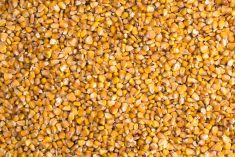A new DNA-based process to identify wheat varieties, designed with hopes that it will take over where the now-scrapped kernel visual distinguishability (KVD) standard left off, has picked up nearly $9 million in public funds.
The federal and Saskatchewan governments will provide up to $7.43 million through the cost-shared AgriFlexibility fund, plus another $1.48 million through the Canada-Saskatchewan Western Economic Partnership Agreement (WEPA), over the next five years toward commercialization of the new system.
The DNA-based technology, which was first developed by Agriculture and Agri-Food Canada scientists, could give the grain industry a “cost-effective and consistent” method to identify different wheat varieties and classes in a 24-hour turnaround time, the governments said in a release last week.
Read Also

Senft to step down as CEO of Seeds Canada
Barry Senft, the founding CEO of the five-year-old Seeds Canada organization is stepping down as of January 2026.
AAFC’s research project has found single nucleotide polymorphism (SNP) as a DNA analysis method to distinguish between Canadian wheat classes.
The Saskatchewan Research Council’s (SRC) GenServe Laboratories has licensed AAFC’s technology, to validate its use as a tool for varietal ID in wheat.
GenServe is a genetics facility that already provides DNA tests for agriculture crops and livestock, including animal parentage verification, gene mapping and DNA fingerprinting for plant varieties.
If the test can fill the gap left by KVD, which the federal government removed last year as a class identification tool and a requirement for variety registration, it could “help Canada stay competitive by maintaining its reputation for providing high-quality products to national and international markets.”
The Canadian Wheat Board, partnering with the Manitoba Rural Adaptation Council (MRAC), has also put up $392,000 for developmental work on choosing an appropriate form of DNA testing.
“Best returns”
“We’ve supported this project with both funding and expertise because farmers need a test that assures customers we are providing safe, high-quality grain,” said Swift Current, Sask. farmer Larry Hill, chair of the CWB’s board of directors, in the same release. “This support will help ensure that farmers get the best possible returns for their wheat.”
For now, SRC is validating a DNA-based test that verifies midge insect resistance in wheat varieties. Next, SRC said it will work to determine if the technology can be used to offer “viable” commercial tests for wheat class and variety ID. Scientists and technologists have already been hired for the project, SRC noted.
The WEPA funding to SRC is earmarked for purchases of equipment and software and scaling up the testing process, the governments said.
If SRC is confident that rapid wheat DNA testing can be carried out on a commercial scale, the council said it will then proceed with organizing the services.
“Saskatchewan has been a leader in developing cutting edge technology such as the wheat ID, to boost one of our largest economic engines; agriculture,” provincial Enterprise Minister Ken Cheveldayoff said in the same release.
“We want to build on our knowledge economy by commercializing technologies developed through our innovation system and market that to users around the world,” the Saskatoon MLA said.














